7 Causes of High Blood Sugar in Non-Diabetics [Non-Diabetic Hyperglycemia]

Key Takeaways
If you're a generally healthy person with no family history of diabetes, there’s a chance you have been ignoring your blood sugar. You may have thought that there was no reason to check it without a diabetes diagnosis.
But no matter how healthy you are, blood sugar plays an integral role in how your body functions. In fact, you may be experiencing high blood sugar levels, or hyperglycemia, without even knowing it. Left untreated, chronically high blood sugar can lead to significant health problems.
Let's take a look at what non-diabetic hyperglycemia means for your health and what factors may be causing it.
What is Non-Diabetic Hyperglycemia?
See how Nutrisense can help you reach your wellness potential: Take our quiz here.
Non-diabetic hyperglycemia is a temporary elevation of blood sugar levels in people who don’t have diabetes. Hyperglycemia is defined as a blood glucose level of >126 mg/dL while in a fasting state, and 180 mg/dL one to two hours after a meal. Even if you're generally healthy, you can experience daily more dramatic swings in blood sugar due to dietary and lifestyle factors.
Research has demonstrated that glucose levels in non-diabetics can fluctuate into pre-diabetic or diabetic range. This fluctuation may lead to increased risk for conditions beyond diabetes, including cardiovascular disease, however addressing the underlying cause typically leads to a return to normal blood sugar levels without the need for diabetes-specific treatments.
While hyperglycemia can cause symptoms, it can also easily go unnoticed. A continuous glucose monitor is one way to take a closer look at your glucose levels in real-time, and using a CGM without diabetes can make it easier to identify these fluctuations.
With that in mind, let’s dive into some of the common symptoms and causes of high blood sugar in non-diabetics.
Symptoms of High Blood Sugar in People Without Diabetes
High blood sugar in people without diabetes can be caused by various lifestyle factors, including types of stress encompassing trauma, illness, and surgery, intensive exercise, psychosocial factors, dietary choices, and poor sleep. While these symptoms may not necessarily indicate diabetes, they can still be concerning and should be monitored closely.
Symptoms of high blood sugar in non-diabetics may include:
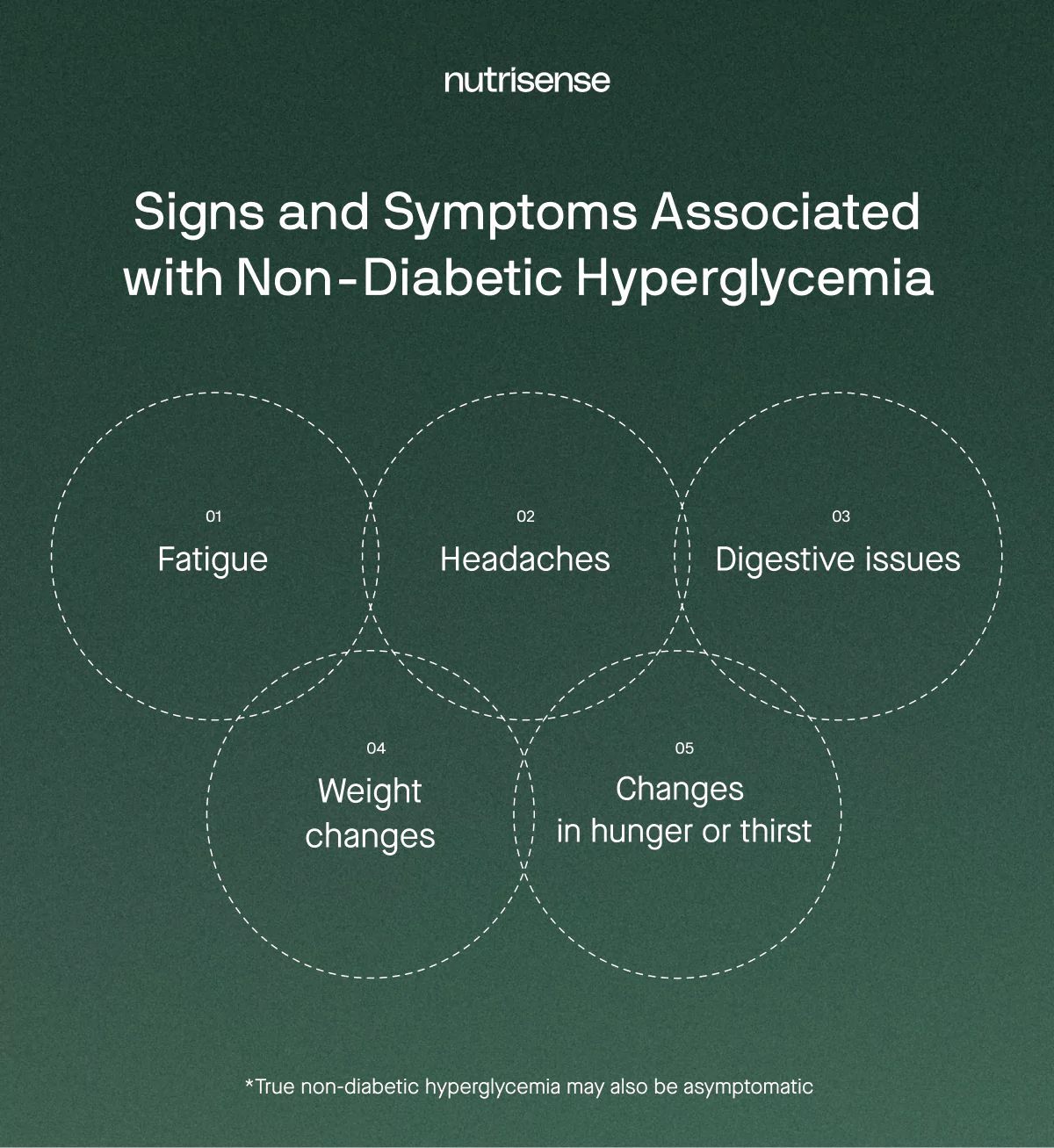
If you think you have any of the symptoms of high blood sugar or if you're at risk for high blood sugar levels, it's important to consult your doctor. A blood sugar test will help assess your risk and determine whether you need to begin a treatment plan.
7 Factors That Can Cause Blood Sugar Rises in Non-Diabetics
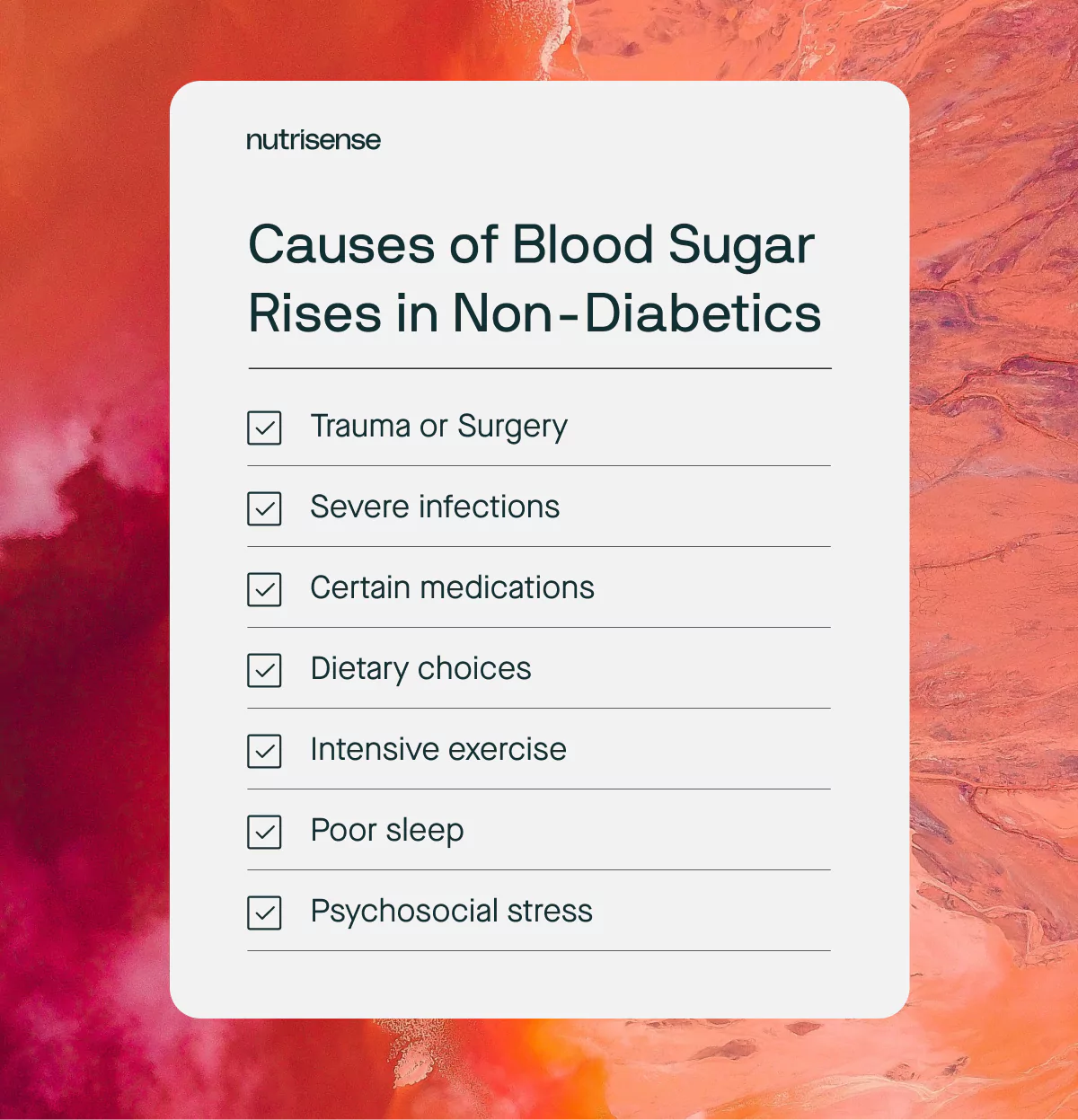
1) Psychosocial Stress
Maybe you’ve had a fight with a friend or loved one, a tough day meeting work deadlines, or a driver cut you off on the road and almost caused an accident. These are all sources of psychosocial stress. Stress arising from social or emotional triggers is one type of stress among many your body may experience.
When you experience rising stress levels, your body kicks off a cascade of reactions designed to give you the resources needed to prepare for a fight or flight response. It does this through activating the hypothalamo-pituitary-adrenocortical (HPA) axis as well as other internal stress-response systems that can lead to raised blood glucose levels.
A brief stressful event isn’t likely to leave your glucose elevated for long. Once it passes and your body is allowed to relax, your glucose will often come back down to normal. But chronic psychosocial stress is a risk factor for developing insulin resistance and diabetes as well as many other diseases.
2) Intensive Exercise

Keeping with our theme of stress-induced changes in hormones that may lead to changes in glucose, it’s not uncommon to see episodes of hyperglycemia during intensive exercise. This tends to be even more exaggerated if someone is dehydrated or possibly not fueling properly for their workouts. Still, it might not always be a bad thing.
As Certified Diabetes Care and Education Specialist (CDCES) Gary Scheiner points out:
“Some forms of physical activity, most notably high-intensity/short duration exercises and competitive sports, can produce a sharp rise in blood sugar levels followed by a delayed drop. This is due primarily to the stress hormone production or ‘adrenaline rush’ that accompanies these kinds of activities.”
However, usually this type of spike will resolve fairly quickly and glucose may fall lower after appropriate and healthy amounts of exercise.
3) Trauma
A traumatic injury or insult to your body will trigger acute activation of the sympathetic nervous system (SNS). This activation is part of how your body responds to stress and the changes in hormones such as cortisol will commonly lead to elevated glucose levels. Usually this may self-correct once the body moves out of the traumatic state of SNS activation.
But what about when acute stress becomes chronic? Chronic stress-response activation is a known risk factor for the development of insulin resistance and diabetes. Examples of physical trauma that may be behind your hyperglycemia can include:
- Head injuries
- Severe burns
- Surgery
Make sure to monitor your condition with your doctor as you heal, and focus on staying healthy, eating a balanced diet, and staying hydrated.
4) Severe Infections
Severe infections can also cause higher stress for your body. In addition to experiencing immune activation and symptoms like a fever, your body releases stress hormones like cortisol that encourage higher blood sugar levels. From the perspective of your body, this is useful to help make simple fuel (glucose) available to the army of defenders ready to fight off the invaders.
Many types of infections may contribute to high blood sugar, including:
- Urinary tract infections
- Pneumonia
- Influenza
If you're suffering or recovering from a severe infection, make sure you follow a healthy, well-balanced diet and follow these tips to relieve any other sources of stress. Consult with your doctor if you feel like you're not getting back to normal or having other side effects as you heal.
5) Certain Medications
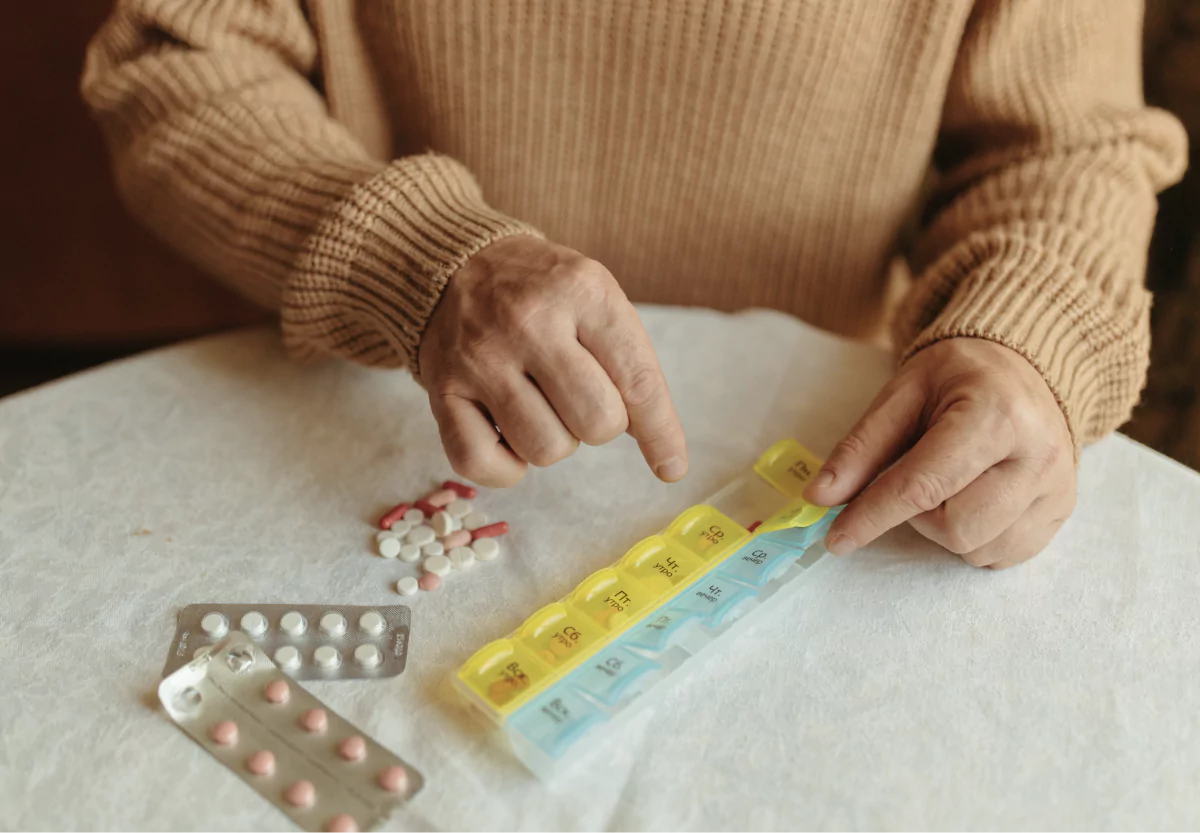
Certain medications with corticosteroids or diuretics can lead to higher blood glucose levels. Thoroughly review any medications you are prescribed with your doctor, and always make sure to read directions on your medications to ensure that you are taking them correctly.
6) Dietary Choices
Your diet plays a huge role in blood sugar regulation, and it’s important for diabetics and non-diabetics alike to be aware of the effects that certain dietary choices may have.
Certain dietary choices like eating carbohydrates by themselves, consuming higher-carb foods (especially later in the day, or eating more refined or processed carbohydrates such as pastas, sugary desserts or candy can lead to higher glucose spikes for some people, even without diabetes.
While occasional episodes of hyperglycemia may not be a serious health concern, repeating this pattern regularly over time may lead to chronic elevation of blood sugar and an increased risk for insulin resistance and diabetes.
Adjusting your diet to include appropriate amounts of protein, fiber, healthy fats, and low glycemic carbs to tolerance in addition to adding the right type and amount of physical activity to your routine can help manage dietary causes of hyperglycemia. If you need support to create a healthy diet plan tailored to your unique needs, consult a qualified nutritionist for guidance.
7) Poor Sleep
Getting enough good quality sleep is important for many reasons, including keeping blood sugar balanced. Research shows that poor sleep and later bedtime routines are associated with more pronounced post-meal glucose responses to breakfast the following morning.
This means you may be more likely to experience hyperglycemia if your sleep hasn’t been so great. Similarly, if you are struggling with poor glucose regulation during the day, it may make it harder for you to sleep well. A potential vicious cycle!
How Is Glucose Tested?
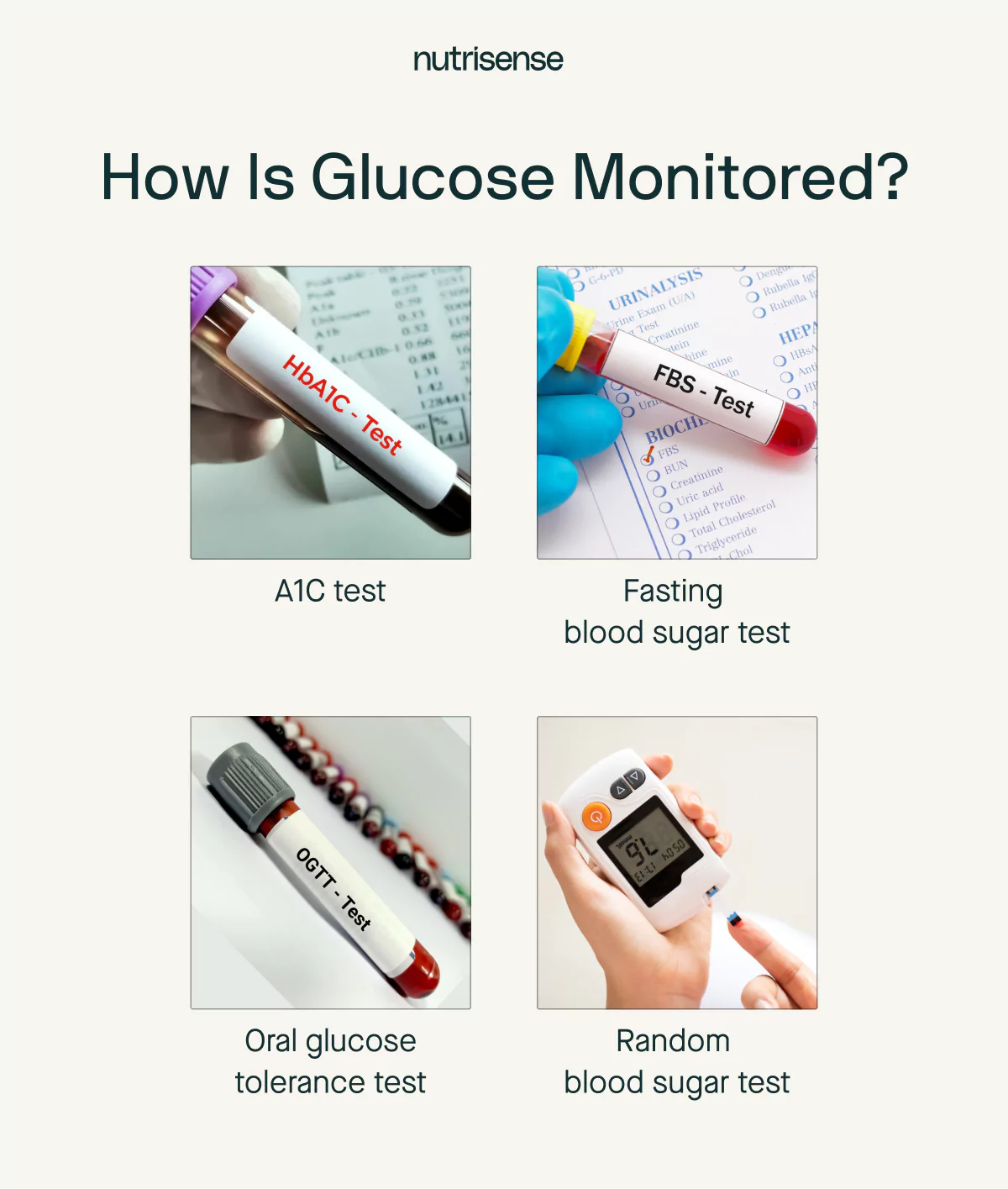
High and low blood sugar levels are known as hyperglycemia and hypoglycemia, respectively. As we discussed earlier, non-diabetic hyperglycemia occurs when blood sugar levels temporarily rise into what might be considered a prediabetic or diabetic range. There are several tests that can be used to test your glucose level, including:
- The A1C test
- Fasting blood sugar test
- Random blood sugar test
Hyperglycemia can also be assessed using something called the oral glucose tolerance test. Here’s how it’s done:
- When you’re in a fasted state, you’re given approximately 75 grams of carbohydrates via a syrupy drink.
- After two hours, your blood sugar level will be tested via a blood test.
- A reading between 140- 200 mg/dL is considered "prediabetic," while diabetic levels are > 200 mg/dL.
One possible caveat of utilizing this test is that it may be possible to see higher than expected readings if you’ve been following a very low carb or keto diet for a long period. You may see a temporary “physiological insulin resistance,” where your muscles prefer using fat over glucose for fuel. But you can reverse this by reintroducing carbs into your diet with the support of your doctor or dietitian for a few days before taking the test.
Leaving hyperglycemia untreated can lead to an increased risk of heart attack, stroke, nerve damage, and damage to your blood vessels, organs, and tissues. Make sure to check in with your doctor or a registered dietitian or nutritionist regularly to make sure your diet and lifestyle habits are optimal for healthy glucose levels.
Is High Morning Blood Sugar Normal in Non-Diabetics?
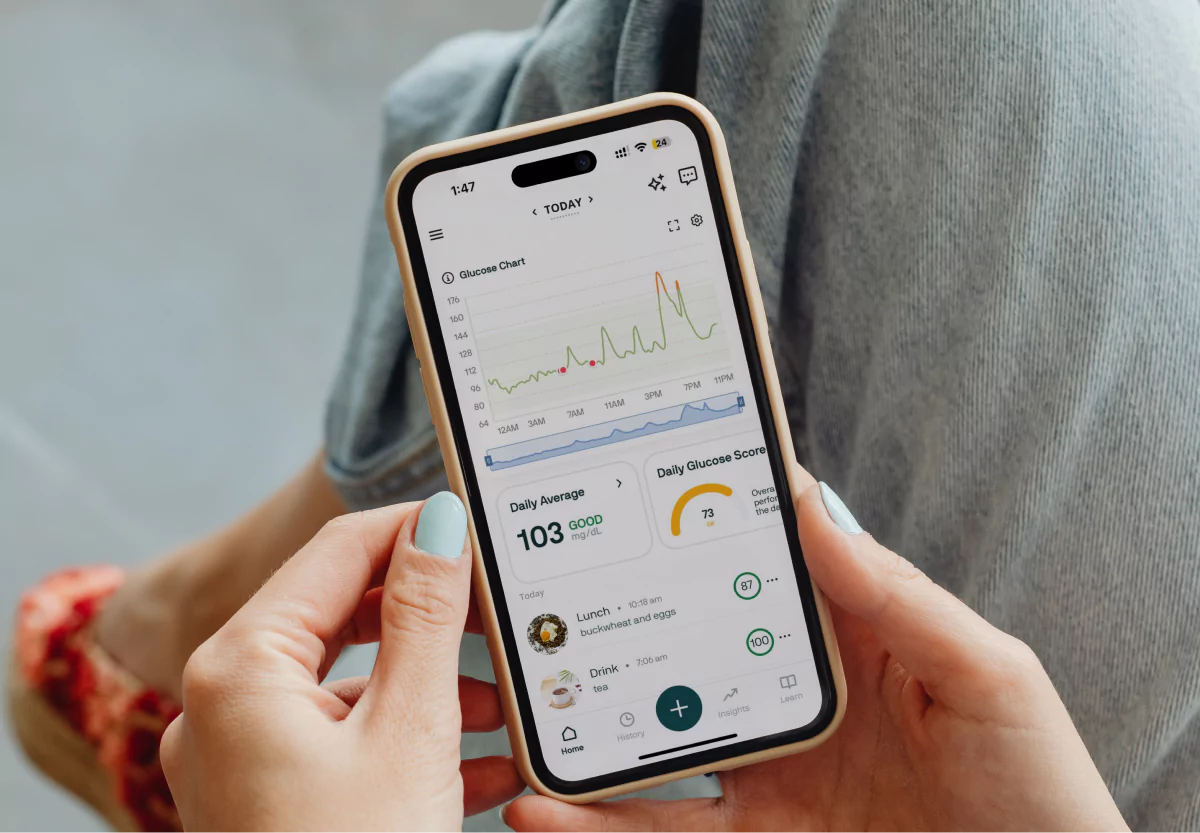
Elevated morning blood sugar levels in non-diabetic individuals can be caused by various factors. This natural physiological response typically occurs due to the release of hormones like cortisol and growth hormone during the early morning hours.
Additionally, the following factors can contribute to higher fasting blood sugar levels in the morning.
- A high-carbohydrate dinner the previous night
- Inappropriate levels of physical activity
- Certain medications
- Other types of physiological stressors
While it's not a cause for alarm in non-diabetics, understanding these triggers can help individuals better manage their overall health and blood sugar levels. As always, consult your doctor if you notice symptoms of high blood sugar for an extended period of time.
Find the right Nutrisense programto turn insight into progress.
Go Beyond Glucose Data with Nutrisense
Your glucose can significantly impact how your body feels and functions. That’s why stable levels are an important factor in supporting overall wellbeing. But viewing glucose isn't enough. Nutrisense, you’ll be able to learn how to use your body's data to make informed lifestyle choices that support healthy living.
One-to-one coaching
Sign up to access insurance-covered video calls to work with a glucose expert: a personal registered dietitian or certified nutritionist who will help tailor your lifestyle and diet to your goals.
Monitor and measure what matters
With the Nutrisense CGM Program, you can monitor your glucose with health tech like glucose biosensors and continuous glucose monitor (CGM)s, and analyze the trends over time with the Nutrisense App. This will help you make the most informed choices about the foods you consume and their impact on your health.
Find your best fit
Ready to take the first step? Start with our quiz to find the right Nutrisense program to help you take control.

Kara Collier is a registered dietitian nutritionist and certified nutrition support clinician who is passionate about reshaping how we approach prevention, behavior change, and metabolic health. A Forbes 30 Under 30 honoree, she’s helped over 150,000 people improve their metabolic health using tools like continuous glucose monitors and behavior-focused nutrition strategies. Kara has been featured by Forbes, UC Berkeley, and HLTH, and has appeared on top podcasts like Mind Pump and The Genius Life.




